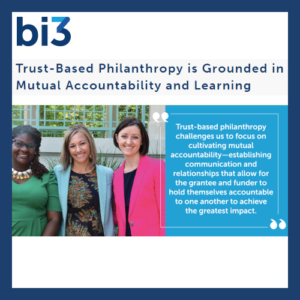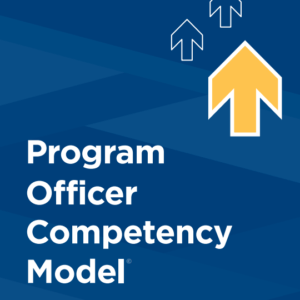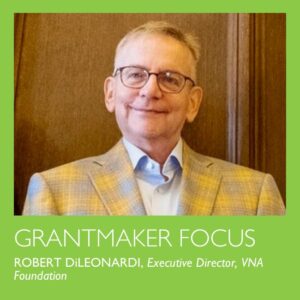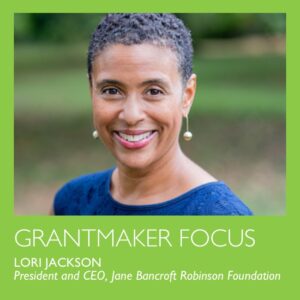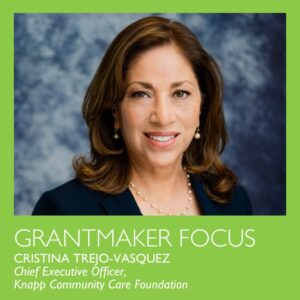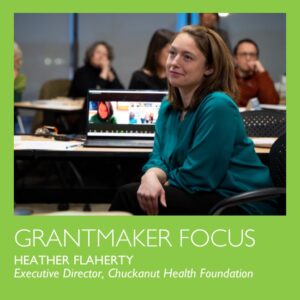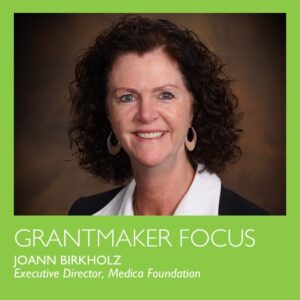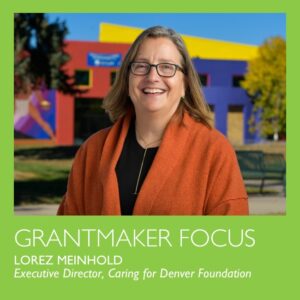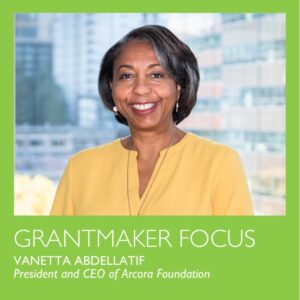Featured Resources
bi3 Article: Trust-Based Philanthropy is Grounded in Mutual Accountability and Learning
A new article shows how applying a trust-based philanthropy lens helps funders capture the full impact of grants, describes how bi3 evaluates initiatives, and how building funder-grantee relationships grounded in power-sharing, transparency, and mutual accountability helps achieve greater impact.
New Competency Model for Foundation Program Officers Released
The Dorothy A. Johnson Center on Philanthropy at Grand Valley State University has released a competency model for foundation program officers.
Taking A cultivate approach to Improve Community Health
Health foundations are increasingly recognizing that their mission is not simply to award grants to deserving nonprofit organizations, but rather to play a catalytic role in improving the conditions that influence health, especially at a population level.
Latest Resources
VNA Foundation
“There is never a shortage of needs in the communities we serve, but the health-related issues during the past few years have challenged our team to think creatively, expansively, and collaboratively. We believe private philanthropy should take risks and implement strategies to meet immediate health needs more efficiently and effectively. Being part of a community like GIH—which allows for the sharing of ideas, successes, and lessons learned—has been invaluable.”
Jane Bancroft Robinson Foundation
“The approach for Black Women Thriving is imperative now because we haven’t seen the disparities reduce over time. And in fact, the disparities are increasing. Black women are the core of the community. They’re the decisionmakers in their families, and the caretakers in the community. Finding the best approach to lift up their lives and their voice, improve their health outcomes and economic mobility, will have an economic and social benefit across communities. So, it’s something that we must do, and we can’t ignore any longer.”
Knapp Community Care Foundation
“Philanthropy is the catalyst that holds the key to unlocking the boundless potential of communities, setting in motion a powerful ripple effect of positive change that elevates the quality of life, enhances health outcomes, and fosters lasting prosperity. Investing in crucial areas such as educational opportunities, equitable health care access, and economic empowerment initiatives can bridge gaps and pave the way for a future where prosperity knows no boundaries. Through strategic philanthropic endeavors, we have the transformative ability to uplift entire communities. By fostering a culture of giving and collaboration, philanthropy becomes a driving force behind building a society where compassion, empathy, and collective action reign.”
Chuckanut Health Foundation
“Philanthropy can and should be the risk capital for social good. In this field, we are positioned to be bold and to stretch for love, justice, health, community, and humanity. We can take the risks that many organizations can’t, and we can use our funds and our power to do the work, but not control the work. It is not always the size of the grants that we give out that make the most impact—it’s the doors we open, the tables where we give up our seats to voices who need to be heard, the new tables, structures, and systems we build in partnership with those most impacted by the issues we’re working to address, and the trust we build with our community partners through longevity, relationship, and consistency—that allow for the work that is needed to happen in our communities, to happen meaningfully and sustainably.”
Medica Foundation
““The Medica Foundation especially values programs that utilize tools to deliver mental health care where it’s most needed, and that overcome obstacles like race, language, economic status, geographic location, or historical distrust of the health care system. Both telehealth and mobile health care units are reaching communities and populations that were previously unrepresented and making inroads to building trust in the health care system. We are proud to partner with programs that are delivering care to people through innovative new methods and models.”
Purpose-Driven Investments: Advancing Equity by Diversifying Foundations’ Asset Managers
In 2020, none of the Health Forward Foundation’s assets were managed by Black, Latina, or Latino managers. Struck by that stark reality, Health Forward began the process of diversifying the asset managers in its investment portfolio as part of a larger strategy to align the Foundation’s capital with its purpose.
Caring for Denver Foundation
“Increased economic and social stress is driving a higher need for mental health and substance misuse care, making the work of our grantee partners even more important than when we were founded. People are ready to talk about and seek help, and Caring for Denver’s grantmaking process is ready to meet this moment because it is centered in reflecting the unique cultural needs, values, and beliefs of the city’s diverse communities.”
Jonas Philanthropies
“Jonas Philanthropies is honored to work with national health leaders to address critical problems in our health care system with a focus on nursing access, quality, and voice. In addition, we are grateful to help support model programs addressing eye care for underserved children, disease prevention through children’s environmental health and advocacy, and model reforestation programs with a triple bottom line focusing on carbon sequestration and community health and resilience for frontline communities”
Arcora Foundation
“Equity is important for our work. The people we serve tell us so. That is why Arcora strives to demonstrate a greater capacity for equitable practices and policies to better engage with communities as an authentic partner.”
Connect With Funder Peers on Governance and Operations
Interested in exchanging strategies, information, and questions with your funder peers? Sign up for GIH E-Forums.

